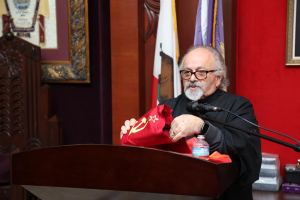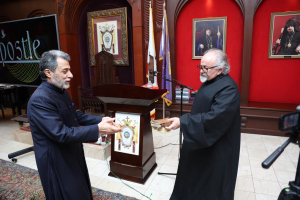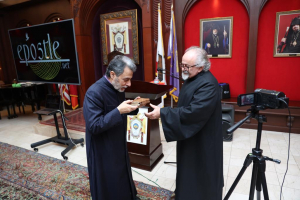All the Ingredients
Armodoxy for Today: Make it Complete with the Message
In rounding up the theme of Maturity of Faith this week, we make it complete with the most essential ingredient, namely the Message. In all the messages we have shared this week, Jesus stands in the center. Often, in our zeal to express our love and commitment to Him, we forget the message he preached and the call of that message to move us to action.
In the Nicene Creed, adopted in 325AD by the Church and recited in churches throughout the world every Sunday, we proclaim our belief in the Father, the Son and the Holy Spirit and the exclusivity of the Holy Church. The largest portion of the Creed is dedicated to Jesus, the Son of God. We have shorter forms of the profession of faith, one of which is confessed by the godfather during baptism in the Armenian Church. In the Western churches, such as the Roman Catholic and Anglican churches, the Apostles Creed is pronounced. In St. Nersess Shnorhali’s prayer of the 4th hour, we read an even more abbreviated form about Jesus, the Son of God, “Who descended from the bosom of the Father, and took flesh of the Holy Virgin Mary for our salvation, who was crucified and buried, and rose from the dead and ascended to the Father.”
In all of the Creeds and professions of faith, the person of Jesus, the Son of God, is defined. What is missing is a proclamation about his message, or even more simply, mention or reference of his message. I use the word “missing” rather than “omitted” or “forgotten” because I believe the development of these creeds were products of the times and societal needs. In the case of the Armenian Church, her constituency during the early centuries was homogeneous. The people attended church and shared common values and so it wasn’t necessary to reference the message in a creed.
Armodoxy is about taking that ancient faith and placing it in today’s world and society. In a globalized society, where many different messages are vying for your attention, Jesus’ message can easily be dismissed, omitted or even forgotten because of the zealous efforts to proclaim Jesus as superior to other choices. Mature faith understands that it is Jesus’ message, that is unique and superior to all else. In his message we understand the fulness of the statement that God is love. Jesus’ message is what connects us to the beginning of time, and therein we find the Divinity of Jesus as the Son of God. “I am not here on my own authority, but he who sent me is true.” (John 7:28)
Let us pray St. Nersess Shnorhli’s prayer of the 4th hour, with addendum, “Son of God, true God, who descended from the bosom of the Father, and took flesh of the Holy Virgin Mary for our salvation, who taught the message of true love and compassion, with his words and his life, who was crucified and buried, and rose from the dead and ascended to the Father, I have sinned against Heaven and before You, remember me like the robber when You come into your kingdom. Amen.”





